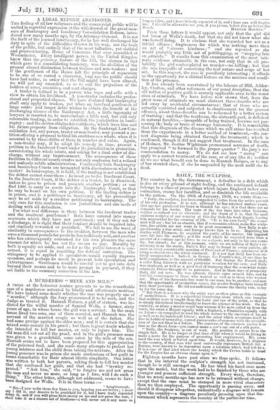A LEGAL REFORM ABANDONED.
THE feeling of all law reformers and the commercial public will be united in regretful expression at the withdrawal of the great mea- sure of Bankruptcy and Insolvency Consolidation Reform, intro- duced now many months ago, by the Attorney-General. It is not the fault of the learned functionary, for he has well discharged his duty in spite of the difficulties thrown in his way, nor the fault of the public, but entirely that of the most talkative, yet slothful and procrastinating, House of Commons that ever assembled at Westminster. Every intelligent person in the United Kingdou knew that the primary feature of the bill, the clauses in fact which gave it a consolidating tendency, was the abolition of the present absurd distinction between trailers and non-traders ; and if the gentlemen of the House felt the principle of reparation to be one of so sacred a character, long ago the public should have had notice, in order that the Bill might have been altered, we will not say amended, so as to suit the prejudices of the holders of acres, annuities, and rent charges. A trader is defined to be a person who buys and sells with a view to obtain his livelihood. A non-trader includes the profes- sional and propertied classes. We have declared that bankruptcy shall only apply to traders, yet when an involved gentleman of large estate and larger debts wishes to obtain the benefit of the discharging clauses of the Bankruptcy Act, a little ingenuity of lawyers is resorted to, to manufacture a little real, but still only colourable trading, in order to establish the jurisdiction in bank- ruptcy; and the debtor obtains his certificate which frees him and his future property from obligation. By the Bankrupt Law Con- solidation Act, any person, trader or non-trader, may present a pe- tition offering a proposal to bind his creditors as a whole, when it is assented to by three-fifths of them in number and value. Again, a non-trader may, if he adopt his remedy in time, present a petition to the Insolvent Court under its jurisdiction in protection, surrendering his whole estate, and asking for a final order of dis- charge, without any imprisonment. The consequence of these facilities in different courts creates not only confusion but a refined and uselessly subtle administration. Continually both Bankruptcy and Insolvency Courts are tormented with discussions on what is a trader? In bankruptcy, it is held, if the trading is not established the debtor cannot come there ; he must go to the Insolvent Court. In the Insolvent Court, if the debtor is a trader, he is dismissed, unless he goes to prison and presents another petition ; or can find 150/. to carry as assets into the Bankruptcy Court, so that he may be heard on his own petition. If the trading debtor is in prison, and is a petitioner in insolvency, all his proceedings may be set aside by a creditor petitioning in. bankruptcy. The only cure for this confusion is one jurisdiction and one mode of dealing with all defaulters.
For what real difference is there between the insolvent trader and the insolvent gentleman ? Both have entered into money contracts which they have not performed ; and if they ask for a discharge, it is right that their conduct should be inquired into, and similarly rewarded or punished. We fail to see the want of similarity in consequences to the creditor, between the man who owes a thousand pounds for goods he has recklessly sold, and another who has extravagantly consumed for his own pleasure the same amount for which he has not the means to pay. Morality by both is equally set aside, and so far as the public interest is con- cerned, it is equal in requiring the debtors' correction. The stringency to be applied to speculators would equally improve spenders, and perhaps do much to prevent both speculation and extravagance. Gentlemen would be careful not to get into debt beyond their means and to be more prompt in payment, if they are liable to the summary correction of the law.


























 Previous page
Previous page